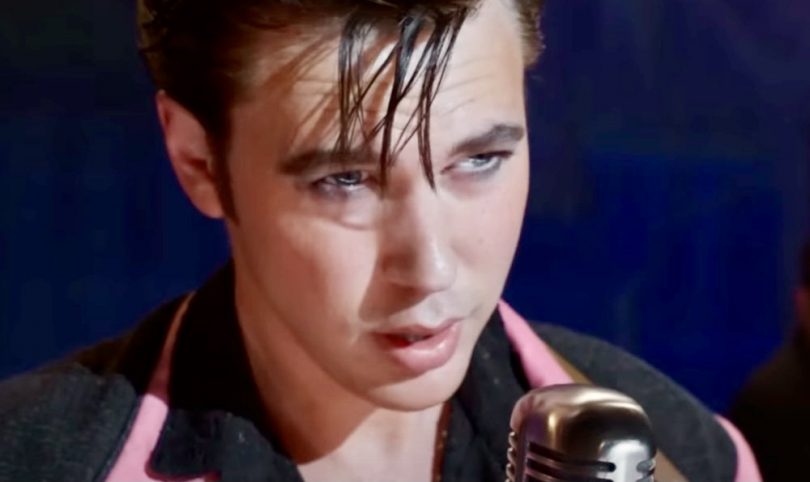Baz Luhrman presents Elvis Presley’s life for what it is: a 20th-century tragedy of Shakespearean proportions.
With more than a touch of Faust.
“Elvis” (PG-13, 159 minutes, in theaters) zips along like a sped-up highlight reel of the Presley saga – from his humble beginnings in Tupelo, Mississippi, and Memphis, Tennessee, and phenomenal rise as a rock ‘n’ roll sex symbol to his early demise as a bloated, Vegas caricature.
Director Luhrman (“Moulin Rouge,” “The Great Gatsby”) loves to generate energy with quick cuts from one image to another, and that’s certainly the case here. It’s moviemaking for short attention spans, appropriate for audiences accustomed to information overload without much depth. (Perhaps that makes me sound like a grumpy old man. Still …)
Starring Austin Butler as Elvis, the film touches on the people in the singer’s personal orbit, including wife Priscilla (Olivia DeJonge), mother Gladys (Helen Thomson) and father Vernon (Richard Roxburgh).
But its focus is the relationship between Presley and his manager/Svengali, “Colonel” Tom Parker (Tom Hanks).
Early on, Presley brings the religious fervor of his youth to the stage with a rebellious, provocative physicality that makes female audience members swoon and later earns him the nickname “Elvis the Pelvis.” When Parker – a huckster through and through, with a carny background – catches the pretty boy’s fiery act, he knows he’s found his meal ticket.
Like an agent of the devil, Parker lures the naive Presley into his fold with promises of fortune (a pink Cadillac for Mama!) and fame. And, yes, the price eventually turns out to be the boy’s soul, as, again and again, Parker tries, often successfully, to persuade his star to sacrifice his artistic integrity and smooth away his edge for commercial considerations. As a result, when Presley expands his career to include film work with the hopes of becoming a serious actor like James Dean, he winds up instead making hokey Hollywood dreck like “Harum Scarum.” He seems to reclaim his rock ‘n’ roll credibility when, clad in black leather and going back to his musical roots, he makes a dramatic comeback on a late ’60s TV special. But Parker soon manipulates him into going the glitzy Las Vegas route for the easy bucks.
Race also plays a significant part in Presley’s story. The young Presley is inspired by the black blues musicians he encounters on Beale Street in Memphis, and throughout his life he’s shown to have an affinity for black people. Meanwhile, the white detractors who object to early Elvis, calling him “a white boy with black hips” and accusing him of “animal behavior,” are the same racists intent on maintaining segregation. To these people, the young upstart is, like black people, dangerous and needs to be kept in line. This, too, causes a tug-of-war between Presley, whose instinct is to resist such pressure, and Parker, who argues for taking the path of least resistance.
Butler explodes on the screen (not literally) as Presley. Talk about a tough task: embodying this legendary, beloved American icon by not only looking like him (which Butler does), but capturing his essence as it changes over time. Butler pulls it all off, whether projecting the charisma and magnetism of the young, lean Elvis or depicting the dazed, drug-fueled obliviousness of the gaudy, obese mess he later becomes.
Hanks is less successful as Parker. Sporting a fat suit (presumably) and laying on a heavy European accent, he comes across as a sinister version of S.K. “Cuddles” Sakall (Carl, the head waiter, in “Casablanca”; look him up). It seems less a performance than a grab for Oscar attention, and it’s more a distraction than anything else.
Butler, though, he’s something to see. *** (out of four)
Calling Dr. Howard …
It’s a backhanded compliment, I suppose, to call something “good for what it is.”
But that’s the case with the horror flick “The Black Phone” (R, 102 minutes, in theaters). It stars Ethan Hawke as a child abductor known as “The Grabber.” The Grabber drives around lower-class suburban Denver in a black van with ‘Abracadabra” written on its side, stalking young boys, capturing them and sticking them in a locked, soundproofed room in a basement. The Grabber wears demonic masks, but he is no silent killing machine like Michael Myers of the “Halloween” movies and Jason Voorhees of the “Friday the 13th” slashers.
The Grabber talks, even giggles at times. He is clearly out of his skull and is scary.
That’s the thing about this movie: It’s meant to frighten. To unsettle you. And Hawke’s Grabber does the job. Director and co-writer Scott Derrickson (“Doctor Strange,” “Sinister”), adapting a short story by Joe Hill (Stephen King’s son, who apparently has picked up a lot from Dad), also tosses in a few choice jump scares, and Mark Korven’s dread-inducing, sometimes screechy music adds to the ambience. There are even bits of comic relief, though the movie could have used more.
The Grabber’s latest victim is a nice kid named Finney (Mason Thames). Finney lives with his sister, Gwen (Madeleine McGraw), who has psychic powers, and their physically abusive, alcoholic father (Jeremy Davies). When the Grabber takes Finney, Gwen tries to aid the police in finding him.
Meanwhile, Finney awaits his fate, alone in the basement. There’s a black phone in the room (you probably guessed there would be one somewhere), and it rings from time to time. When Finney answers, he discovers … well, that would be giving too much away. It’s creepy.
“The Black Phone” presents the world as a dark, dangerous place, and not just because of the Grabber. Finney not only encounters abuse at home, but from bullies at school, and in both places it can be brutal. The film at times seems to condone extreme violence for audience-pleasing catharsis, but more disturbing is the apparent ease with which it downplays parental child abuse toward the end: Dad might beat you, but he’s actually a really caring guy. The obvious moral of the story is that you have to stick up for yourself if you want to survive.
Despite the film’s limitations, Hawke makes “The Black Phone” worthwhile for those who enjoy this sort of thing. **½
** Click here for Tim Miller’s previous movie columns for Cape Cod Wave **
Please like Cape Cod Wave on Facebook.
Cape Cod Wave Magazine covers the character & culture of Cape Cod. Please see our Longform stories.
Tim Miller is a Cape-based member of the Boston Society of Film Critics. He also teaches film and journalism at Cape Cod Community College in West Barnstable. You can contact Tim at [email protected] or follow him onTwitter @TimMillerCritic. Or you can ignore him completely.


































